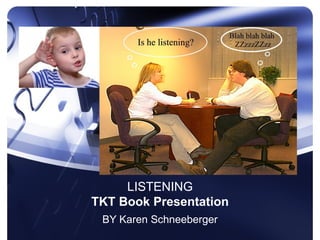Listening2
- 1. LISTENING TKT Book Presentation BY Karen Schneeberger
- 2. Listening The International Listening Association (1996) defines listening as the process of receiving, constructing meaning from, and responding to spoken and/or nonverbal messages.
- 3. ŌĆ£If speaking is silver, then listening is gold.ŌĆØ -Turkish Proverb
- 4. Three Types of Listening 1. Content listening Involves understanding and retaining basic information flowing from the speaker to you. It is important to minimize note taking and instead to make a mental outline of the key points. It is imperative to understand the message.
- 5. Three Types of Listening 2.Critical listening Entails evaluating the logic, strength, and validity of a message. Refrain from making judgements about the speaker and information until the end because it is difficult to absorb information and evaluate it at the same time. Also, you want to assess the speakerŌĆÖs credibility. The speakerŌĆÖs nonverbal signals are good indicators of uncertainty and honesty.
- 6. Three Types of Listening 3. Active listening Involves interpreting the speakerŌĆÖs feelings, needs, and wants. Avoid judging the other personŌĆÖs feeling and try not to give advice ŌĆō just let the individual talk. Listen emphatically and attempt to understand the speakerŌĆÖs point of view.
- 7. To Listen Effectively Find areas of interest. Judge content, not delivery. Hold your fire. Listen for ideas. Be flexible. Work at listening. Resist distractions. Exercise your mind. Keep your mind open. Capitalize on the fact that thought is faster than speech
- 8. The Good Listener Judges content over delivery errors. DoesnŌĆÖt judge until comprehension in complete; interrupts only to clarify. Listens for central themes. Takes fewer notes. Exhibits active body state. Fights or avoids distractions; tolerates bad habits; knows how to concentrate. Interprets emotional words. Challenges; anticipates; mentally summarizes; weighs the evidence; listens between the lines to tone of voice.
- 9. Conclusion Listening is extremely important if individuals wish to orally communicate successfully. Although it may seem that the speaker plays the major role in this type of communication, the listener is equally important because if the listener does not understand the message, the speakerŌĆÖs entire purpose is useless. If the listener can not understand what the speaker is trying to convey, then clear oral communication is not occurring.
- 10. Conclusion Listening is a part of our everyday lives and it is a skill we use constantly. Most people who enter the ŌĆśreal worldŌĆÖ should have had plenty of experience throughout their lives listening to others and should have mastered the skill by now. However, this is not the case. Many individuals still underestimate how important it is to listen, and continue to speak unnecessarily.










